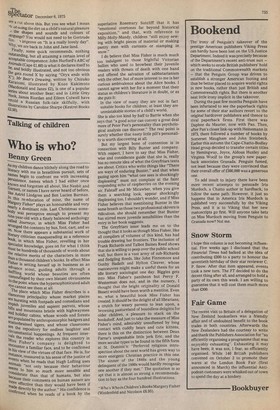Bookend
. The irony of Penguin's takeover of the prestige American publishers Viking Press can hardly have been lost on the US Justice Department. Indeed it was precisely because of the Department's recent anti-trust suit — which seeks to erode British publishers' hold on the traditional Commonwealth markets — that the Penguin Group was driven to establish a stronger American footing and thus be better placed to acquire world rights in new books, rather than just British and Commonwealth rights. But there is another neat little irony implicit in the takeover. During the past few months Penguin have been infuriated to see the paperback rights for some of their star authors revert to the original hardcover publishers and thence to rival paperback firms. First there was Daphne du Maurier, now with Pan. Then, after Pan's closer link-up with Heinemann in 1973, there followed a number of books by Somerset Maugham and John Steinbeck. Earlier this autumn the Cape-Chatto-Bodley Head group decided to transfer certain titles by Hemingway, Joyce, Aldous Huxley and Virginia Woolf to the group's new paperback associates Granada. Penguin fumed, not least because they were convinced that their overall offer of £300,000 was a generous one.
To add insult to injury there have been more recent attempts to persuade Iris Murdoch, a Chatto author in hardback, to follow the same path. However, it just so happens that in America Iris Murdoch is published very successfully by the Viking Press, and it is to Viking that her new manuscripts go first. Will anyone take bets on Miss Murdoch moving from Penguin to Granada now? Not me.
Snow Storm
I hope this column is not becoming influential. Five weeks ago I disclosed that the Financial Times had balked at the idea of contributing £300 to a party to honour the seventieth birthday of their star reviewer C. P. Snow. After that item appeared, events took a new turn. The FT decided to do the decent thing after all, and arranged to hold a party of its own this week. I am willing to guarantee that it will cost them much more than £300.
Fair Game
The recent visit to Britain of a delegation of New Zealand booksellers was a friendly affair and of undoubted benefit to the book trades in both countries. Afterwards the New Zealanders had the courtesy to write and thank the Publishers Association for "so efficiently organising a programme that was enjoyably exhausting". Exhausting it may have been; it was not, I fear, so efficiently organised. While 140 British publishers convened on October 2 to promote their wares at the London Book Fair (first announced in March) the influential Antipodean customers were whisked out of town to spend the day at a bindery.
Bookbuyer

































 Previous page
Previous page